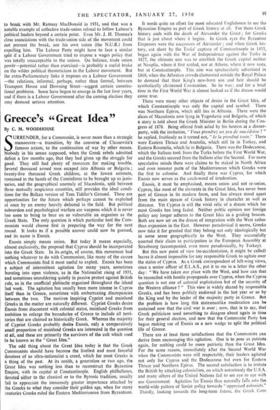Greece's " Great Idea"
By C. M. WOODHOUSE
SURRENDER, for a Communist, is never more than a strategic manoeuvre—a transition, by the converse of Clausewitz's famous axiom, to the continuation of war by other means. Nobody in his senses supposed, when the Greek rebels admitted defeat a few months ago, that they had given up the struggle for good. They still had plenty of resources for making trouble. Several thousand armed men escaped into Albania or Bulgaria ; twenty-five thousand Greek children, at the lowest estimate, remained in the hands of the Cominform to be brought up as janis- saries, and the geographical anomaly of Macedonia, split between three mutually suspicious countries, still provides the ideal condi- tions for the Balkan version of Tom Tiddler's Ground. These are opportunities for the future which perhaps cannot be exploited at once by an enemy heavily defeated in the field. But political subversion and psychological warfare are weapons which it is never too soon to bring to bear on so vulnerable an organism as the Greek State. The only question is which particular tool the Com- munists would choose first in preparing the way for the next round. It looks as if a possible answer could now be guessed, and its name is Enosis.
Enosis simply means union. But today it means especially, almost exclusively, the proposal that Cyprus should be incorporated Into the Greek State. In its .origin, of course, this movement had nothing whatever to do with Communism, like many of the causes which Communists find it most useful to exploit. Enosis has been a subject of intermittent agitation for many years, sometimes bursting into open violence, as in the Nationalist rising of 1931, and sometimes smouldering quietly in passive protest against British rule, as in the unofficial plebiscite organised throughout the island last week. The agitation has usually been more intense in Cyprus Itself than in Greece, sometimes with embarrassing discrepancies between the two. The motives inspiring Cypriot and mainland Greeks in the matter are naturally different. Cypriot Greeks desire Enosis from discontent with colonial status, mainland Greeks from ambition to enlarge the boundaries of Greece to Include all terri- tories that are claimed as historically Greek. Whereas the majority of Cypriot Greeks probably desire Enosis, only a comparatively small proportion of mainland Greeks are interested in the question at all, and these are primarily the survivors of the cult which used to be known as the "Great Idea."
The odd thing about the Great Idea today is that the Greek Communists should have become the liveliest and most forceful devotees of so ultra-nationalist a creed, which for most Greeks is a thing of the past. At its zenith, a generation or two ago, the Great Idea was nothing less than to reconstruct the Byzantine Empire, with its capital at Constantinople. English philhellenes, devoted either to the classical or to the Byronic tradition, usually fail to appreciate the immensely greater importance attached by the Greeks to what they consider their golden age, when for many centuries Greeks ruled the Eastern Mediterranean from Byzantium. It needs quite an effort for most educated Englishmen to see the Byzantine Empire as part of Greek history at all. For them Greek history ends with the death of Alexander the Great ; for Greeks that is just about where it begins. In Greek eyes the Byzantine Emperors were the successors of Alexander ; and when Greek his- tory, cut short by the Turks' capture of Constantinople in 1453, began again with the War of Independence against the Turks in 1827, the ultimate aim was to establish the Greek capital neither at Nauplia, where it first settled, nor at Athens, where it now rests, but at Constantinople. This aim was spectacularly advertised in 1868, when the Athenian crowds clamoured outside the Royal Palace
to demand that their King's new-born son and heir should be symbolically christened Constantine. So he was ; and for a brief time in the First World War it almost looked as if the dream would come true.
There were many other objects of desire in the Great Idea, of which Constantinople was only the capital and symbol. There was Northern Epirus, which still lies in Albania. There were the
slices of Macedonia now lying in Yugoslavia and Bulgaria, of which a story is told about the Greek Minister in Berlin during the Con-
gress of 1878. Being offered fruit salad by his hostess at a dinner- party, with the invitation, " Vous prendrez un peu de macedoine? " he replied, fruitlessly as it turned out, "le la prendral mute." There were Eastern Thrace and Anatolia, which still lie in Turkey, and Eastern Roumelia, which lie in Bulgaria. There was the Dodecanese, which the Italians took from the Turks before the First World War, and the Greeks secured from the Italians after the Second. For more speculative minds there were claims to be staked in North Africa and even remoter parts of the Mediterranean which Greeks were the first to colonise. And finally there was Cyprus, for which Enosis now serves as the catch-word of irredentism.
Enosis, it must be emphasised, means union and not re-union. Cyprus, like most of the elements in the Great Idea, has never been part of Greece in its modern form, and has always stood apart from the main stream of Greek history in character as well as distance. Yet Cyprus is still the vivid relic of a dream which for most Greeks has long faded. Neither public opinion nor foreign policy any longer adheres to the Great Idea as a guiding beacon. Both are now set on the dream of integration with the West rather than expansion in the East. However paradoxical it seems, Greeks now take it for granted that they belong not only ideologically but in some sense geographically to the West. They successfully asserted their claim to participation in the European Assembly at Strasbourg (accompanied, even more paradoxically, by Turkey).
But this new point of view (re-occidentation, it might be called) leaves it almost impossible for any responsible Greek to agitate over the status of Cyprus. As a Greek correspondent of left-wing views,
once a senior officer of E.L.A.S., put it to me in a letter the other day: "We have taken our place with the West, and how can that
be reconciled with hostile propaganda over Cyprus, when the Cyprus question is not one of colonial exploitation but of the security of the Western alliance ? " This view is widely shared by responsible Greeks, and has been publicly endorsed in the last year or so by the King and by the leader of the majority party in Greece. But the problem is how long this statesmanlike moderation can be
sustained now that the civil war is over ; now, that is to say, that Greek politicians need something to disagree about again in time for their general election, and now that the Communist Party has begun making use of Enosis as a new wedge to split the political life of Greece.
There are at least three satisfactions that the Communists can derive from encouraging this agitation. One is to pose as patriots again, for nothing could be more patriotic than the Great Idea. For the same reason, immediately after the Second World War when the Communists were still respectable, their leaders agitated not only for Cyprus and the Dodecanese but even for Eastern Thrace and Northern Epirus. The second satisfaction is to irritate the British by attacking colonialism, on which notoriously the U.S.A. and many others of the United Nations fail to see eye to eye with our Government. Agitation for Enosis thus naturally falls into the world-wide pattern of Soviet policy towards "oppressed colonials." Thirdly, looking towards the long-term future, the Greek Corn' munists must assume that eventually they will gain power in Greece ; so it would be convenient to collect Cyprus juridic ally at the same time, as an integral part of Greece, instead of having to make it the subject of a separate operation.
The fact that the Communists are left as the last serious adherents of the Great Idea, and the potential leaders of the Enosis campaign, has therefore great dangers for the future of Greece now that relative normality is returning. Cunning exploitation of it will appeal to many simple Greeks, just as the delusion of E.A.M. (the National Liberation Front) did during the German occupation. Other political parties will therefore have to declare themselves for or against it, and some of them will not forget its vote-catching appeal. They may well divide for and against it along the same lines of cleavage as have shown themselves distressingly often in 'the last few years between those democratic Greeks who look chiefly to the U.S.A. for salvation and those who still rest their confidence in Great Britain. There are plenty of adventurers still ready to play off these two influences against each other. In this way the Communists may hope with one wedge to split Allied policy, as it was split in China, and to divide Greece catastrophically On a relatively trivial issue, as it was divided in 1936 and 1944. In 1936 Greece only survived at the price of a dictatorship, and in 1944 at the price of revolution. The issue of Enosis is of no more moment to the Greeks' welfare now than were the constitutional issues then. It is none too early to watch the danger that may grow from it.











































 Previous page
Previous page